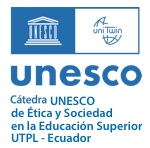Un enfoque de STS para alfabetización digital crítica
Resumen
En respuesta al I Simposio de Pensamiento Contemporáneo a ser celebrado en la Universidad Técnica Particular de Loja, cuyo tema central es «Nuevas Tecnologías en la Educación», tomo inspiración en las tradiciones académicas de Estudios de Medios y Estudios de Ciencia y Tecnología para sugerir un enfoque conceptual hacia la alfabetización digital crítica en entornos educativos.
Descargas
Referencias
Bijker, Wiebe (2010). «How is Technology Made? That is the question!». Cambridge Journal of Economics 34 (1): pp. 63–76. doi: 10.1093/cje/bep068.
Brown, Nik (2003). «Hope Against Hype: Accountability in Biopasts, Presents and Futures». Social Studies of Science 16 (2): pp. 3–21.
Buckingham, David (2015). «Defining digital literacy: What do young people need to know about digital media?» Nordic Journal of Digital Literacy 1 (4): pp. 21–34.
Couldry, Nick (2017). «The Myth of Big Data». In: The Datafied Society: Studying Culture through Data, edited by Mirko Schäfer and Karin van Es. Amsterdam: Amsterdam University Press, 2017, pp. 235–239. doi: 10.5117/9789462981362.
Felt, Ulrike, Rayvon Fouché, Clark Miller, and Laurel Smith–Doer (2017). «Introduction to the Fourth Edition of the Handbook of Science and Technology Studies». In: The Handbook of Science and Technology Studies, edited by Ulrike Felt, Rayvon Fouché, Clark Miller, and Laurel Smith–Doer. 4th ed. Cambridge: The MIT Press, 2017, pp. 1–26.
Franklin, Seb (2015). Control: Digitality as Cultural Logic. Cambridge: The MIT Press.
Freebody, Peter, and Allan Luke (1990). «Literacies programs: Debates and demands in cultural context». Prospect: Australian Journal of TESOL 5 (3): pp. 7–16.
Galloway, Alexander (2004). Protocol: How Control Exists after Decentralization. Cambridge: The MIT Press.
Gilster, Paul (1997). Digital Literacy. New York: Wiley Computer Pub.
Haraway, Donna (1988). «Situated Knowledges: The Science Question in Feminism and the Privilege of Partial Perspectives». Feminist Studies 14 (3): pp. 575–599. doi: 10.2307/3178066.
Hinrichsen, Juliet, and Antony Coombs (2013). «The five resources of critical digital literacy: A framework for curriculum integration». Research in Learning Technology 21 (1): pp. 1–16. doi: 10.3402/rlt.v21.21334.
Koltay, Tibor (2011). «The media and the literacies: Media literacy, information literacy, digital literacy». Media, Culture & Society 33 (2): pp. 211–221. doi: 10.1177/0163443710393382.
Latour, Bruno (2005). Reassembling the Social: An Introduction to Actor–Network–Theory. New York: Oxford University Press Inc.
Michael, Mike, and Deborah Lupton (2016). «Toward a manifesto for the ‘public understanding of big data’». Public Understanding of Science 25 (1): pp. 104–116. doi: 10.1177/0963662515609005.
Neyland, Daniel (2016). «Bearing Accountable Witness to the Ethical Algorithmic System». Science, Technology, & Human Values 41 (1): pp. 50–76. doi: 10.1177/0162243915598056.
Pangrazio, Luciana (2016). «Reconceptualising critical digital literacy». Discourse: Studies in the Cultural Politics of Education 37 (2): pp. 163–174. doi: 10.1080/01596306.2014.942836.
Puig de la Bellacasa, Maria (2015). «Making time for soil: Technoscientific futurity and the pace of care». Social Studies of Science 45 (5): pp. 691–716. doi: 10.1177/0306312715599851.
Star, Susan Leigh (1999). «The Ethnography of Infrastructure». American Behavioral Scientist 43 (3): pp. 377–391. doi: 10.1177/00027649921955326
van Dijck, José (2012). «Facebook and the engineering of connectivity: A multi–layered approach to social media platforms». Convergence: The International Journal of Research into New Media Technologies 19 (2): pp. 141–155. doi: 10.1177/1354856512457548.
Vertesi, Janet (2016). «Seizing the Digital». Engaging Science, Technology, and Society 2 (1): pp. 180–192. doi: 10.17351/ests2016.75
Derechos de autor 2019 © Analysis

Esta obra está bajo licencia internacional Creative Commons Reconocimiento-NoComercial-SinObrasDerivadas 4.0.








